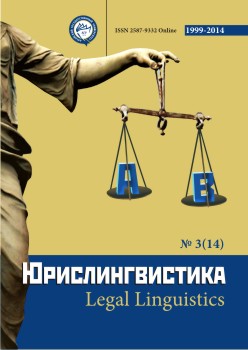PLAYING WITH WORDS: CONTEXTUAL ANALYSIS OF STATEMENTS AND OPINIONS
Abstract
An example of complex analysis of statements and opinions is given. The main principle of analysis is contextual analysis, in other words the phrases were analized in the context of the article; the subsidiary principle is psycholinguistic analysis, which helped to prove the validity of the results.
Downloads
Metrics
References
Бринев, К.И. Теоретическая лингвистика и судебная лингвистическая экспертиза: Монография. Барнаул, 2009.
Обелюнас, Н.В. Конфликт интепретаций текстов в аспекте оппозиций событийной и оценочной информации (на материале текстов российских СМИ): Автореферат диссертации на соискание ученой степени кандидата филологических наук. Кемерово, 2012.
Иваненко, Г.С. Утверждение о факте: форма и содержание//Юрислингвистика: судебная лингвистическая экспертиза, лингвоконфликтология, юридико-лингвистическая герменевтика 2012. Памятка по вопросам назначения судебной лингвистической экспертизы: Для судей, следователей, дознавателей, прокуроров, экспертов, адвокатов и юрисконсультов. М., 2004.
Copyright (c) 2017 Юрислингвистика

This work is licensed under a Creative Commons Attribution 4.0 International License.
The authors, which are published in this journal, agree to the following conditions:
1. Authors retain the copyright to the work and transfer to the journal the right of the first publication along with the work, at the same time licensing it under the terms of the Creative Commons Attribution License, which allows others to distribute this work with the obligatory indication of the authorship of this work and a link to the original publication in this journal .
2. The authors retain the right to enter into separate, additional contractual agreements for the non-exclusive distribution of the version of the work published by this journal (for example, to place it in the university depository or to publish it in a book), with reference to the original publication in this journal.
3. Authors are allowed to post their work on the Internet (for example, in a university repository or on their personal website) before and during the review process of this journal, as this may lead to a productive discussion, as well as more links to this published work (See The Effect of Open Access).











